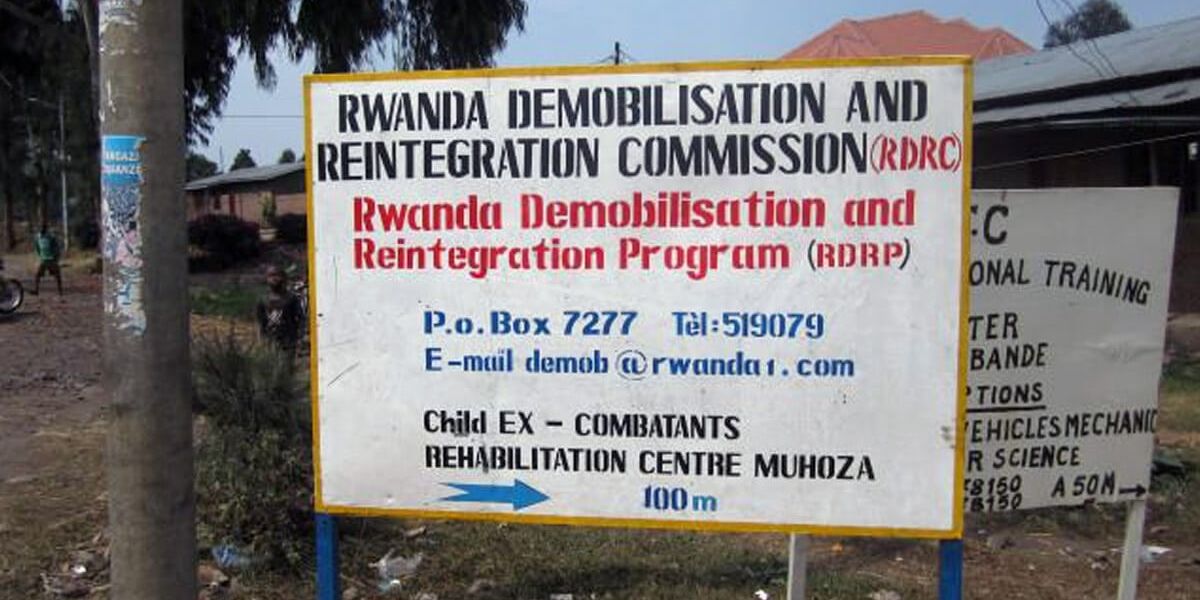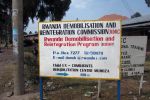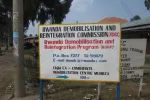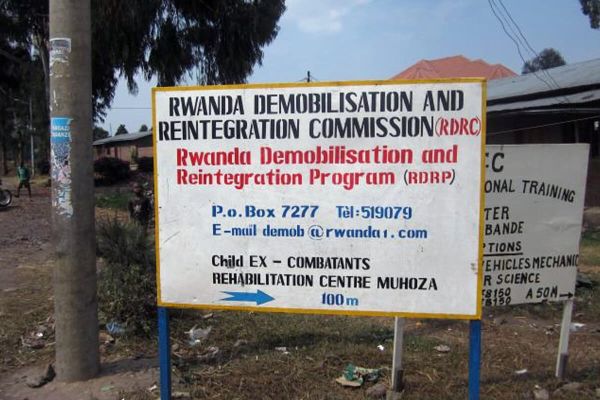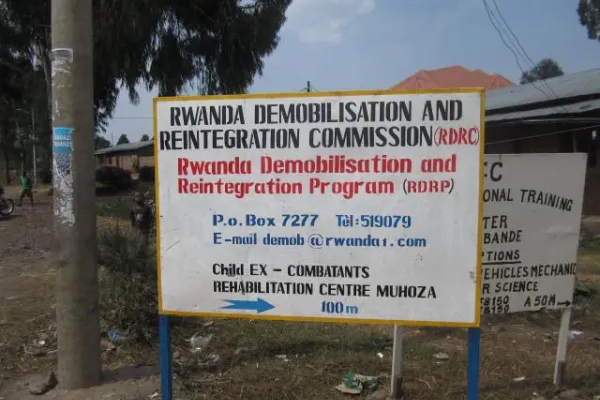It is common knowledge that many child combatants are active in the DRC conflict today. Sometimes child combatants manage to leave the armed group that they are supposed to serve. What happens to Rwandan child combatants after they escape? How are they demobilized and reintegrated into society? How do we even know if they are children? And how does Rwandan government policy on this matter relate to international law?
Child combatants that manage to get away from an armed group in the DRC in which they are serving, report usually to the UN or the ICRC. If they are Rwandan, they are sent to a special demobilization camp in the Rwandan western province, as part of the Rwanda Demobilization and Reintegration Program. When I visited this camp, there were 46 children, ages said to be 14-19 years. This was considered a “quiet period”, because at that moment there was a period of relative rest in the DR Congo after an outburst of violence earlier in the year. In this camp, children get some basic education (upon arrival most are illiterate), which includes reading, writing, the Rwandan language and Rwandan history. There is one nurse employed for therapeutic purposes. The children follow a weekly schedule of schooling, leisure (sports and games) and therapy.
When they come out of the Congolese jungle they have to tell their age. This determines whether they are children or adults, which has as its first consequence to which camp they are sent (the adult camp or the children’s camp). But often these children do not know their age. For example, I spoke to a boy who, when I asked about his education, said he had finished second class in primary school. He said he was recruited after, ‘at age 16, when he finished his studies’. In the second class of primary school in Rwanda you are usually 8 years old. The conversation in which I tried to find out about his current age and his age at the moment of recruitment is illustrative for the complexity of child combatants and information about age:
MH: What is your education?
Int: He was recruited for soldier when he was in second primary.
MH: Second primary, and then?
Int: When he got into soldier. When he got recruited.
MH: How old was he in second primary?
Int: 16 years.
MH: In 2nd primary you are 16 years?
Int: He went into…he was recruited when he had finished his studies.
MH: So, finished primary school?
Int: He was recruited when he was in 2 primary.
MH: But in the second of primary, you are not 16 then, are you?
Int: He was born here, in Bukavu, and he was being recruited when he was in secondary school.
MH: Secondary school?
Int: Not secondary school. In primary school.
MH: So how come he was at primary school when he was 16 years old?
Int: He started when he was very young.
MH: He started what?
Int: To study. To go to school. He thinks it was between 10 or 15.
MH: When he started?
Int: Yes.
MH: Do you know how old you are?
Int: He doesn’t know. He guesses.
The respondent said he was 18 years old now, but he looked more like 16 years old to me. Later during the conversation the respondent said he was confused ‘because of the bullets’. For three of four former child combatants that I spoke to, I was certain their true age was not how old they said or thought they were – they all seemed younger.
These former child combatants get to stay in the camp for a minimum of three months and a maximum of nine months. During this period authorities try to locate family members and to reunite the children with their families – but, according to the stories I heard, this is often not very successful. Either families can’t be found or they are in the DRC, children who were recruited at a very young age might not know where they come from at all, etc. After finishing the Demobilization and Reintegration program, each person gets about €120 and a food package. They are encouraged by the two camp leaders to group together, to stay together, add up their money to be able to rent a place and maybe buy some supplies, like for example some simcards or postcards or other things they can sell in the street. There is no follow-up from the government.
The question is if in this situation the Rwandan government acts in accordance with formal law. Are these “all feasible measures” that can be taken to ensure protection and care for children who are affected by an armed conflict (CRC, art. 38.4)? Does the Rwandan government in this respect take ‘all appropriate measures to promote physical and psychological recovery and social reintegration of a child victim of (…) armed conflicts’ (CRC, art. 39)?
From my experience in the camp for former child combatants, I can positively confirm that this recovery takes place in ‘an environment which fosters the health, self-respect and dignity of the child’ (CRC, art. 39). The question is of course if all former child combatants get to go to the camp, but this seems likely since there is a follow-up situation from the point where children report to the UN up until they get to the camp, by the ICRC. However, I worry about what happens when children leave the camp. What do you do when you are a 15 year old child who, after spending six months in the camp, is put in the street with some money and some food (and maybe some friends)? Where do you go? What are you going to do? You are most likely traumatized by your experiences, you have hardly had proper schooling and now you have to survive, probably start your own business or work on a farm. I am not sure if the Rwandan government in this sense takes all appropriate measures. This situation, after children leave the camp, conflicts with Rwandan national law too, for example part two of art. 24: ‘A child who is temporarily or definitively deprived of his or her birth family shall be entitled (…) to a replacement protection which could consist of his or her placement in a foster family, an adoptive family or a placement in a relevant social welfare institution’. This does not happen. In this sense the Rwandan government can do more; they can for example find foster families for these former child combatants and provide opportunities for counselling if necessary. If they were to change policy in this respect, they have to take into account the fact that age in this situation is not a good designator anymore to decide whether someone is a child. A 15 year old child might say he is 18 years old.
The content of this article is based on the 2014 research "Childhood and Children's Rights", attachment 1: Rwandan child combantants.
